Best way to discover: Turkey Package Tours
Turkey Package Tours : Turkey is a country of contrasts and history, because of its geographical location, the lands of Turkey witnessed the mass migration of diverse peoples shaping the course of history. The home to countless civilizations, today’s Turkey developed a unique synthesis of modern and ancient cultures, literature with its own distinct and unique identity and closer to Western civilizations, yet linked to its predecessors through insoluble threads.
In the land of a thousand cultures, every step is a different experience. Located at the crossroads of multiple civilizations, Turkey has many stories to tell. Almost every street, every building has a tale to share. If you are looking for a trip back in time, then the ticket you’ve been looking for is right here in Turkey. Turkey is where endless curiosity meets its match. The only thing you have to do is to say “merhaba” to endless possibilities and start discovering them! Join us and visit a country known as “the cradle of civilisation” being that the soils have seen many of the great empires and civilizations in history.
Anatolian cities are said to be among the earliest human settlements in the world, from the miraculously preserved monuments of the Hellenistic-Roman civilizations to the path to Noah’s ark. Whatever it is you are looking for in an adventure or tour, Turkey has it all. Want history? Feel centuries of history beneath your feet as you walk through the ancient ruins of Ephesus, where the Temple of Artemis stands, which is one of the Seven Wonders of the Ancient World; or visit the beautiful Ihlara valley, where early Christians escaping Roman Soldiers took up settlement, carving hundreds of churches and underground cities into the unique rock formations. Then the diverse landscapes of Turkey from the cities to the coastline, mountains and lakes lend plenty of opportunity for variety and activities for the adventurous traveler.
Eskapas’ Turkey package tours are a synthesis of culture, history, adventure fun and relaxation. The following sites are the part of itineraries. We hope you will enjoy this short guide to decide which travel package you want to book with us.
Important Sites in Western Turkey
Istanbul
Once the Roman capital of Constantinople, Istanbul is a one-of-a-kind city. Straddling both Asia and Europe it embodies the collision of these two continents and cultures. A major Turkish city, this melting-pot is known for its diverse history; ancient civilizations ranging from the Greek, Persians, Romans, Venetians, and Ottomans have all left their influences on modern-day Istanbul and it was once a pivotal stop on the continent-spanning Silk Road.
One of the world’s largest cities by population, Istanbul sits on the narrow Bosphorus Strait and is home to a glittering array of historic buildings, diverse neighborhoods, and dizzying bazaars. A trip to Istanbul offers countless unique experiences: go shopping in the Grand Bazaar, the largest and oldest in the world, take a scenic cruise on the Bosphorus and admire centuries-old Byzantine frescoes in the city’s oldest churches. Turkey Package Tours. Read also Turkey family tours
Istanbul is sure to provide for the culture-hungry traveler. You cannot imagine a holiday to Istanbul without thinking about the delicious cuisine on offer. Aside from the mouth-watering kebabs, mezze, fresh fruits and vegetables, warming cups of Turkish coffees, the classic tastes of Istanbul, not to mention the fruity aroma of shisha, you’ll find the city’s cultural diversity in its cuisine as well. Almost all corners of the world and their accompanying delicacies are represented in Istanbul.
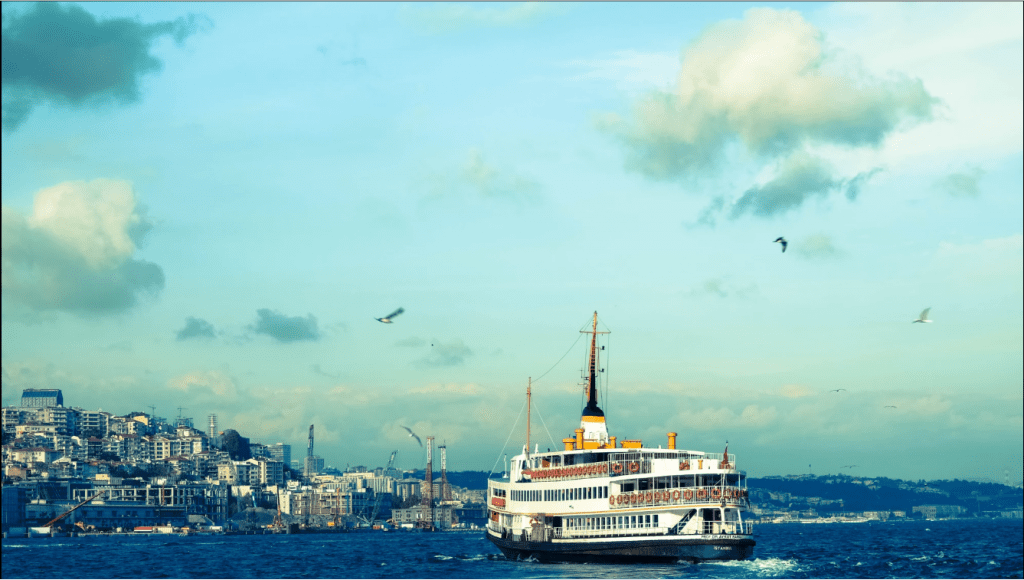
What to see in Istanbul
There’s a long list of things to see in Istanbul, and something to spark the interest of any kind of traveler, whether you’re a foodie, a culture-junkie or a history buff. The Hagia Sophia ranks high on the list of places to see in Istanbul, thanks to its long, complex history. It is, without a doubt, one of the most famous places of worship in the world. Originally a church, later converted to a mosque and, today, a fascinating museum, the Hagia Sophia is the epitome of Byzantine architecture and easily identifiable by its huge dome and minarets. A stone’s throw away from the Hagia Sophia is another unmissable icon of the city and a must-see sight on a tour of Istanbul; the Blue Mosque. With 13 domes and 6 minarets, its an impressive structure, dating from the early 17th-century when it was constructed by Ahmed I in a bid to emphasize the pious nature of his leadership. The mosque continues to welcome worshippers through its doors today and its common name comes from its dazzling blue exterior, a theme that continues inside to the decorative hand-painted tiles that adorn the interior. Be aware when visiting the Blue Mosque that it is still a functioning place of worship and you may be required to wait up to 90 minutes during prayer times before tourists are allowed to enter the building again.
Another of Istanbul’s treasure-chest of cultural gems is the Topkapi Palace, once the home of the Ottoman elite and today a huge museum. A guided tour is the best way to discover the secrets and fascinating history of this Ottoman emblem. Set across a huge complex, it’s interior boasts elaborate, golden decorations, whilst the exterior is home to well-kept gardens. The hillside location of the palace ensures brilliant photo opportunities and panoramic views across the city. Turkey Package Tours
Fancy delving into the golden years of glorious Constantinople? Then there’s no better place to visit on a tour of Istanbul than the Hippodrome of Constantinople, today more widely known as Sultan Ahmet Square. Once the sporting and social center of the ancient capital, today a number of historic relics from across the world have been preserved in the square, originally erected by Constantine and his successors to raise the status of the newly founded city. Perhaps the most impressive is the Obelisk of Thutmose III, brought from Luxor to Constantinople in the year 380. Other sights to see if you visit the Hippodrome of Constantinople include the Serpent Column, from ancient Greece and the Walled Obelisk. If all this talk of Istanbul’s glamorous past has got you longing for a taste of everyday life in the city, there’s no better place to immerse yourself in Ottoman-era Turkey than in the Grand Bazaar. Home to more than 4,000 shops, it attracts up to half a million visitors a day! A sprawling indoors shopping paradise, it’s easy to get lost, but that’s part of the experience. Be sure to stop for tea at one of the bazaar’s cafes to people-watch and pick up bargaining tips.
If you’re still left yearning for more retail therapy following a trip to the Grand Bazaar, the Egyptian Spice Bazaar is another of the top things to see in Istanbul. The oldest bazaar in the city, here you can bask in the exotic aromas of fragrant spices and sample some of Turkey’s best-loved delicacies. Visiting the Egyptian Spice Bazaar is like taking a journey through Africa, Asia, and the Middle East as flavors from across the globe are represented here, making it a foodie paradise.
Ankara
Ankara is the beating heart of Turkey. It is the capital city, a centre of Turkish politics and home to a huge student population. Although Ankara may be Istanbul’s more modern counterpart, it holds a fascinating history behind its concrete facade. Sometimes wrongly overlooked, a trip to Ankara is sure to be a rewarding insight into authentic Turkey. From the Mausoleum of Ataturk to the gigantic Kocatepe Mosque and the medieval remains of Ankara Castle, travel to Ankara to fill your boots with fantastic insights into Turkish culture and heritage.
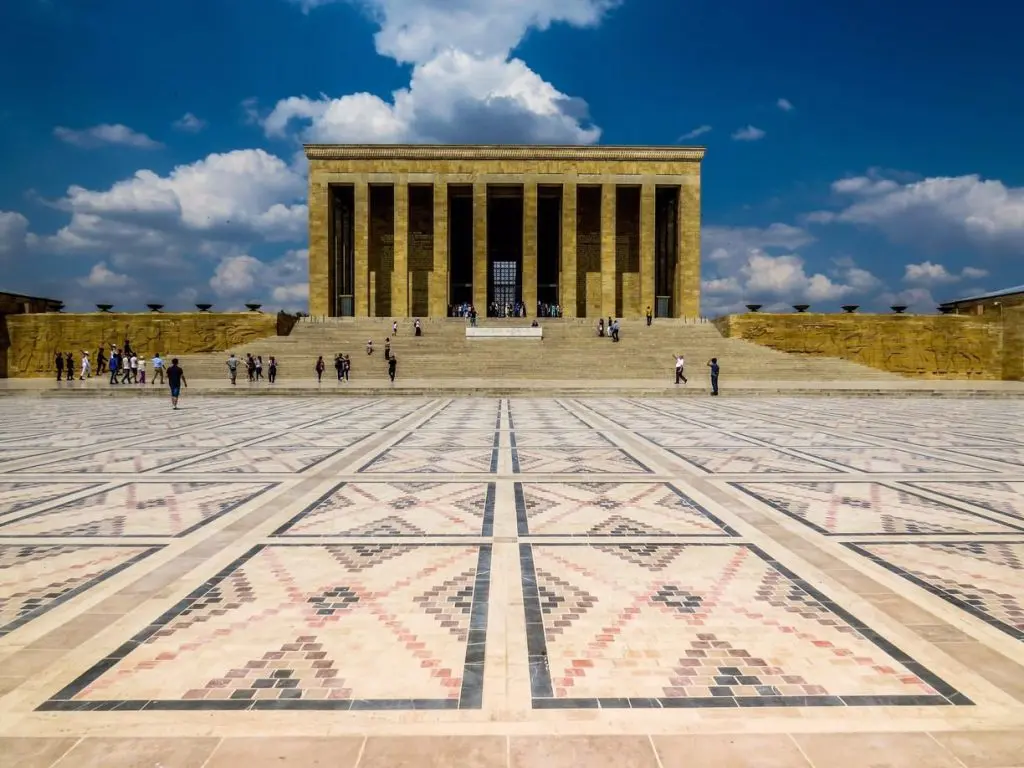
The legacy of civilisations as diverse as the Hittites, Persians,Greeks, Romans and Byzantines are still present throughout the city’s impressive archaeological sites, making Ankara a paradise for budding historians, whilst countless museums, a booming restaurant scene and a vibrant, gritty street life gives Ankara all the appeal you’d expect from a thriving capital city. Once a modest provincial town, following the establishment of the Republic of Turkey, Ankara grew and grew, becoming a purpose-built capital due to its location at the centre of the nation.
Each neighbourhood has it’s own distinct vibe, from hip and trendy Kizilay, filled with fashionable students, to the cultural hub of Cankaya. A city of contrasts, you’ll still find traditional bazaars in the old town, but with the added bonus of being able to dine on international cuisine and zip between sights on the city’s metro system. Travel to Ankara and discover a forward-looking Turkey, a world away from the paradise beaches of the resort towns and the well-trodden streets of Istanbul. Turkey Package Tours
What to see in Ankara
Ankara is home to a range of sights to suit all tastes and a fascinating mix of things to see that help visitors explore a multitude of fascinating aspects of Turkish culture and history. Many visitors travel to Ankara to visit Anikabir, the mausoleum of Mustafa Kemal Ataturk, the much-loved founder of the Republic of Turkey. An imposing structure, combining influences of ancient Anatolian and Turkish design, it’s worth giving yourself enough time to explore the extensive underground museum to learn about Ataturk and Turkish heritage. Another important museum of Ankara is Anatolian Civilisations Museum is also in our Turkey package tours.
Cappadocia
The fairy tale chimneys and honeycomb rock formations of Cappadocia capture the imagination of all who set eyes on them. Situated in the historical region of Central Anatolia, Cappadocia sits on a plateau, interspersed by volcanic peaks, whose eruptions created the rock sediments that, over centuries of erosion, have formed the weird and wonderful landscape that tempts travelers to travel to Cappadocia today! From the Roman period onward, the people of Central Anatolia made good use of these soft stone deposits, crafting them into homes, churches, monasteries and cave dwellings, with Göreme, today Cappadocia’s most visited destination, established as a monastic center around the year 300. Perhaps the most astounding aspect of Cappadocia, aside from its spell-binding landscape, is what lies beneath its otherworldly rock formations.
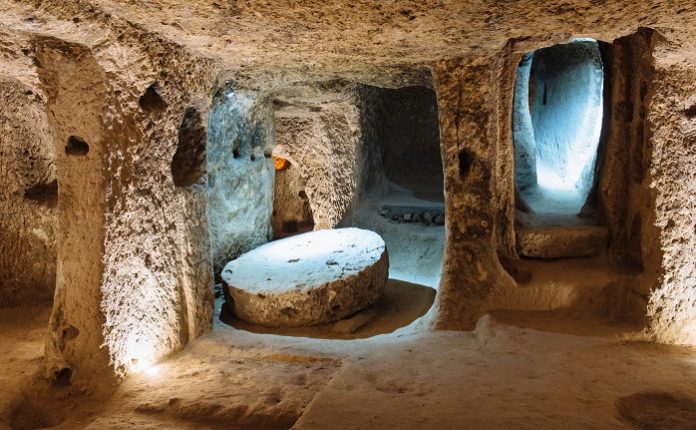
The Özkonak underground city is an ancient multi-level cave city in Cappadocia, Turkey. Stone used as a door in the old underground city
Complex underground cave systems such as Derinkuyu and Kaymakli defy belief with their multi-story cave dwellings, once used by early Christians to hide from persecutors. Nevşehir, Ürgüp , and Göreme are the three largest cities and the focal point of most tours to Cappadocia, although some of the strangest and most impressive natural wonders lie outside the inhabited centers, where vast valleys and gorges hide a number of hidden gems. A UNESCO World Heritage Site, Cappadocia’s sunset landscapes, dotted with buoyant hot-air balloons, is the stuff that dreams are made of, not to mention a hiking enthusiast’s paradise.
What to see in Cappadocia
There are countless hidden gems and fascinating things to see in Cappadocia if you know where to find them. Pop on a pair of hiking boots and explore the area on foot to discover the secret churches and elaborate cave systems that make this region so unique. The best place to start on a tour of Cappadocia is the Göreme Open Air Museum, a UNESCO World Heritage Site and the top attraction in the region. Dating back to Byzantine times, when it was a thriving monastic center of Anatolia, Göreme’s rock-hewn churches contain beautiful examples of Byzantine frescoes. There are over ten churches, as well as dwellings, refectories, and a religious school that has been preserved over the centuries and visiting Göreme you get a fantastic idea of what life was like here during medieval times as you wander through the cave structures and carefully carved chapels and chambers. The Dark Church is one of the highlights of Göreme, as it’s lack of windows and sunlight, have ensured the preservation of some of the most vibrantly colored frescoes in the entire region.
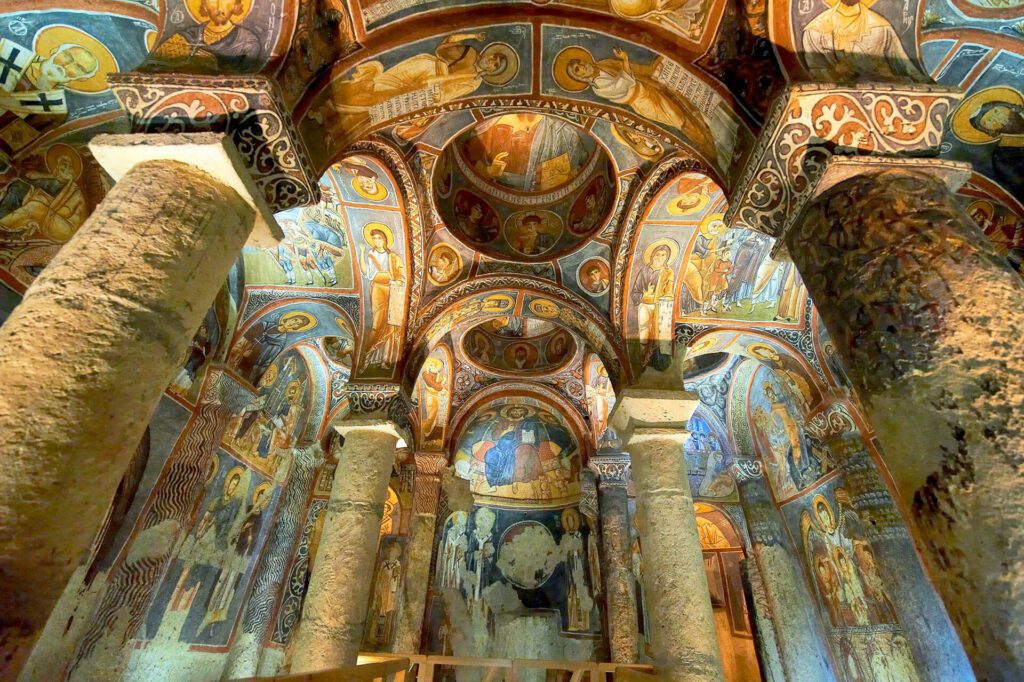
The Cappadocia region encompasses a number of different valleys, each known for its unique geological formations, and the Devrent Valley is one of the most astounding. Also known as ‘Imagination Valley’, Devrent is home to fascinating rock formations. In this lunar-like landscape, rocks have taken the forms of all manner of animal and human shapes, prompting your imagination to run wild. Almost like a natural sculpture gallery, a hike in Devrent Valley in one of the most rewarding things to do in Cappadocia. Nearby, the Rose Valley offers an altogether different landscape of pinky-hued rocks and gorges, in contrast to the browns and greys present throughout the rest of the region. Another popular hiking spot, the Rose Valley is one of the best places in Cappadocia to watch the sunset, which only serves to accentuate the beautiful colors of the landscape. It’s also home to the ancient Church of the Three Cosses, whose interior is adorned with early Christian frescoes. For a look at how locals have lived in Cappadocia across the ages, visit Çavuşin, an old village, built into the hillsides surrounding the Red Valley. Traditionally home to Christian Greek communities, these magical rock-hewn dwellings are still inhabited today. One of the highlights of Çavuşin is the Church of St. John the Baptist, the second oldest church in Cappadocia as well as the Church of Nicephorus Phocas, home to amazing frescoes depicting the entire life of Jesus, built by order of the Byzantine Emperor of the same name in the 960s. If there’s one feature that typifies Cappadocia, it’s the fairy chimney, and Monk’s Valley is home to fairy chimneys galore, some measuring up to 15-metres tall! Gigantic mushroom-shaped ones, perfect cone-shaped ones and pointy, minaret-shaped ones; the fairy chimneys of other-worldly Monk’s Valley will leave you awe-struck. This amazing destination owes its name to the monks who once lived here, tempted by the quiet tranquility and isolation of Cappadocia. Within the valley, you’ll find St. Simeon’s Hermitage, where the saint and his disciples set up home in one of the fairy chimneys. Today, if you visit Monk’s Valley you can even climb up inside the hermitage and ascend to the top of the fairy chimney for good views across the landscape.

Hot Air balloons in Göreme
Finally, curious Pigeon’s Valley is another of the most famous things to see in Cappadocia. The valley owes its name to the pigeons who have carved their nests and dovecotes into the soft rocks over the centuries, creating a fascinating landscape of polka-dotted rock formations and fairy chimneys. Unlike most other destinations in Cappadocia, there’s an absence of churches but it’s caves and hiking trails make it a good option for a day trip from Göreme
Konya
Konya wears many hats. Not only is it the spiritual centre of Rumi’s Sufism and an important pilgrimage site, but it’s also a bustling university city and a major economic and industrial centre. Situated in the Central Anatolian Plateau in Turkey, Konya is famously the home of the whirling dervishes and was once the capital of the Sultanate of Rum, the era in which many of the city’s most admirable monuments were built. Well-known as the home of Sufi-thinker, Rumi, Konya is one of Turkey’s more conservative cities, and most local women choose to cover up with head scarfs and the five-times-daily call to prayer can be heard throughout the city. If you visit Konya you’ll find Islamic architecture in all corners of the city, from ancient madrasas to grand mosques, whilst many travel to Konya simply to witness the dance ceremonies of the whirling dervishes in the birthplace of Mevlevi Sufism.
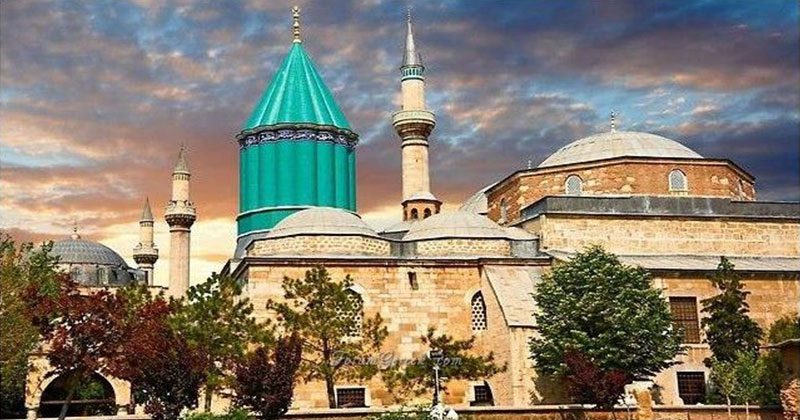
Known as Iconium in antiquity, Konya has a history which stretches back to at least 3000 BC. Civilisations such as the Persians and Romans have all left their unique influence on the city. In the 11th-century Konya was conquered by the Seljuk Turks and became incorporated into the Sultanate of Rum, thought of as the Golden Years of Konya. Nowadays, Konya is a thriving university city, where the traditions of bygone eras blend seamlessly with the forward-looking attitude of its youthful population. One of Turkey’s most compelling cities, be sure to visit Konya for a taste of authentic Seljuk culture and devout spirituality, in a city which perfectly balances the new and the old.
What to see in Konya
With such a fascinating history, there are countless things to see in Konya. As the spiritual centre of Mevlevi Sufism, you cannot miss out on visiting Mevlana Museum, home to the mausoleum of Rumi himself, the famous Persian mystic and founder of Mevlevi Sufism, known more widely as the Whirling Dervishes. It’s the best place to learn all about the teachings of Rum and the practices of the dervishes, although you’ll need to head to the nearby Mevlana Cultural Centre if you want to watch the Whirling Dervishes and their hypnotic ceremonial dancing. o discover more of Konya’s religious heritage, the Iplikci Mosque, dating from the 13th-century is free to visit and hosts daily prayer services. When it was built, this rectangular-shaped mosque was one of the few in the country to have a minaret. Another minaret that punctuates Konya’s skyline is that of the Ince Minaret Madrasa. Also known as the ‘Slender Minaret Madrasa’, this 13th-century Islamic School now functions as an interesting Museum of Stone and Wood Art, showcasing decorative items from both the Seljuk and Ottoman eras. Its stone facade is particularly photogenic with intricate relief carvings depicting geometric shapes and patterns.
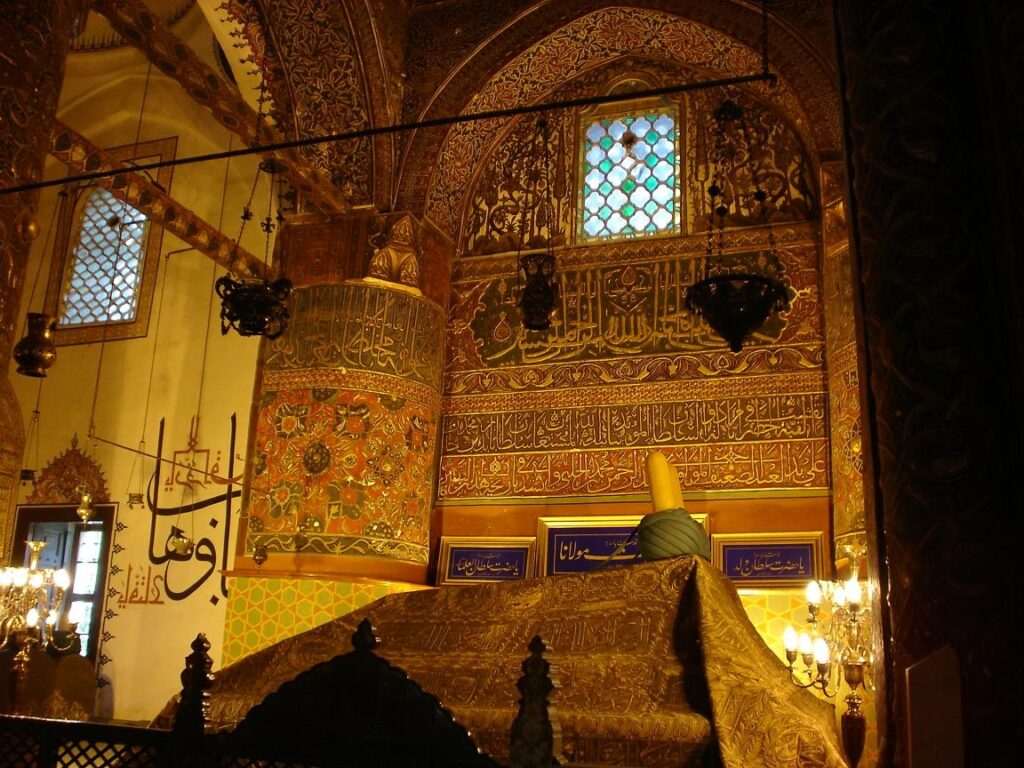
If you’re looking for the perfect place to snap a panoramic photo of the city, head to Aladdin Hill. This artificial hill, built by a Seljuk Sultan, looks out across the flat plains of Konya and is home to the Aladdin Mosque, the oldest and largest in Konya, as well as the remains of the once grandiose Seljuk Palace, former residence of the sultans. Today, the hill has been converted into a public park, granting pleasant views across the city, particularly at sunset. A short journey outside of the city will bring you to one of the most popular places to visit in Konya, the historic village of Sille. Easily reached by a short bus ride from the city, Sille is like an open-air museum, unchanged over the centuries. It is best-known as an example of peaceful coexistence between Christianity and Islam, as, until the 1920s, the village was inhabited by Greeks.
Pamukkale
Turkey is filled with otherworldly landscapes and natural spectacles, but Pamukkale is one of the most exquisite displays of the beauty of nature that you can imagine. White travertine terraces of bright blue water and snow-white limestone decorate the valley sides of Pamukkale, known as the ‘Cotton Caste’. These unique natural formations make a trip to Pamukkale an unmissable highlight of any tour of Turkey. These natural pools were formed as a result of centuries of limestone erosion by thermal springs, and the mineral-rich water of Pamukkale’s pools have long-since attracted visitors thanks to their reputedly therapeutic properties. Hierapolis, the ancient city built around Pamukkale’s natural pools, pays testament to this, as it was constructed around the 2nd-century BC as a spa town to make the most of the warm, mineral-rich waters of this region.
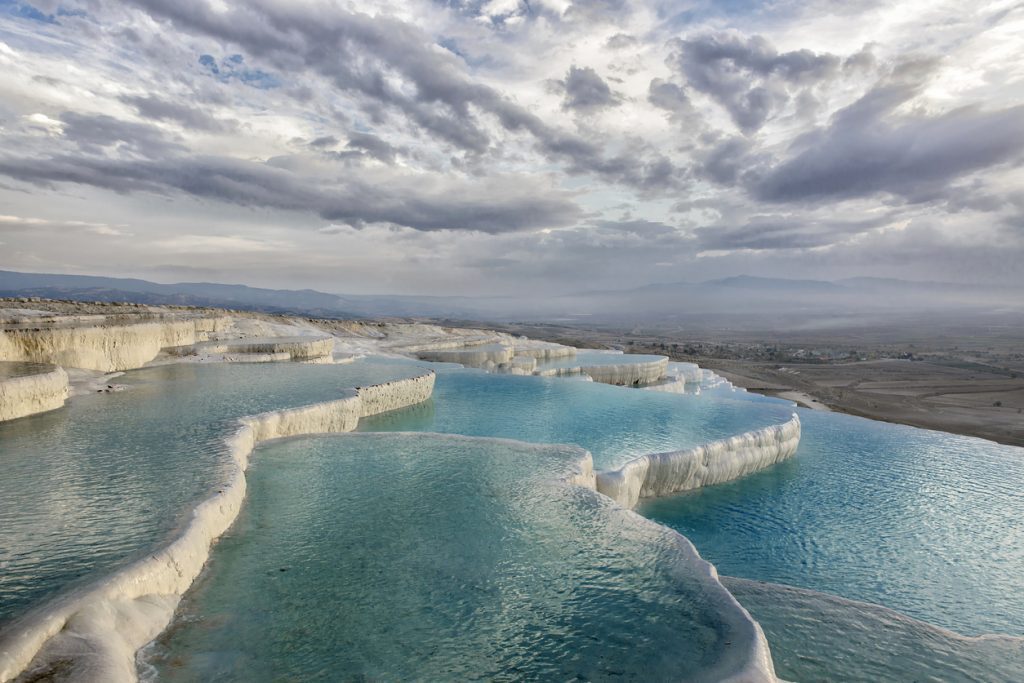
If you travel to Pamukkale today you’ll be astounded by the well-preserved ruins of ancient Hierapolis, with its colonnaded streets and traditional Roman bathhouses. Many of the hotels in Pamukkale boast special pools filled with thermal spring water, although supplies of the mineral-rich water are restricted in order to preserve the delicate balance of the natural limestone pools. A holiday to Pamukkale combines the natural spectacle of its travertine terraces with the atmospheric streets of its ruined Hierapolis, making it one of Turkey’s most coveted destinations and a UNESCO World Heritage Site.
What to see in Pamukkale
It’s little wonder that Pamukkale is a must-see destination for travelers on a tour of Turkey as there are many diverse sights to explore in and around the town. The ‘Cotton Castle’ of travertine pools are by far the most exciting thing to see in Pamukkale. Bright blue pools of thermal water, suspended on the edge of Pamukkale cliff are open to visitors, who can walk and splash through the calcified terraces, although there is a strict no-shoe policy to protect the site from pollution and erosion. Be sure to wear your swimming gear as the higher-level pools are perfect for enjoying a relaxing soak and taking in the spectacular views of the rural Denizli. Avoid the crowds by visiting first thing in the morning or late in the afternoon, and keep in mind that this region of Turkey can be surprisingly cold during the winter months, so the best time of year to visit is in the spring or autumn.
Hierapolis:
Once you’ve conquered the limestone cliffs of Pamukkale it’s time to explore the ancient city of Hierapolis. The Hierapolis Theatre is a good place to start and the breathtaking views across the ruined city and Pamukkale below are well worth the walk. Dating back to Roman times, this two-tiered amphitheatre is remarkably well-preserved. You can even see the remains of a number of luxurious imperial viewing boxes, once frequented by the highest-ranking Romans. Related: Turkey Package Tours. Be sure to leave time to explore the ancient streets of Hierapolis when you visit Pamukkale, as its atmospheric, colonnaded streets paint a vivid picture of life in a Roman spa-town. Dating back to the 2nd-century BC, if you visit Hierapolis today you’ll see a number of ancient ruins including a necropolis, a Byzantine Church and the white marble Temple of Apollo, built upon the mysterious Plutonium, an underground cave that was once believed to be a gateway to the underworld.
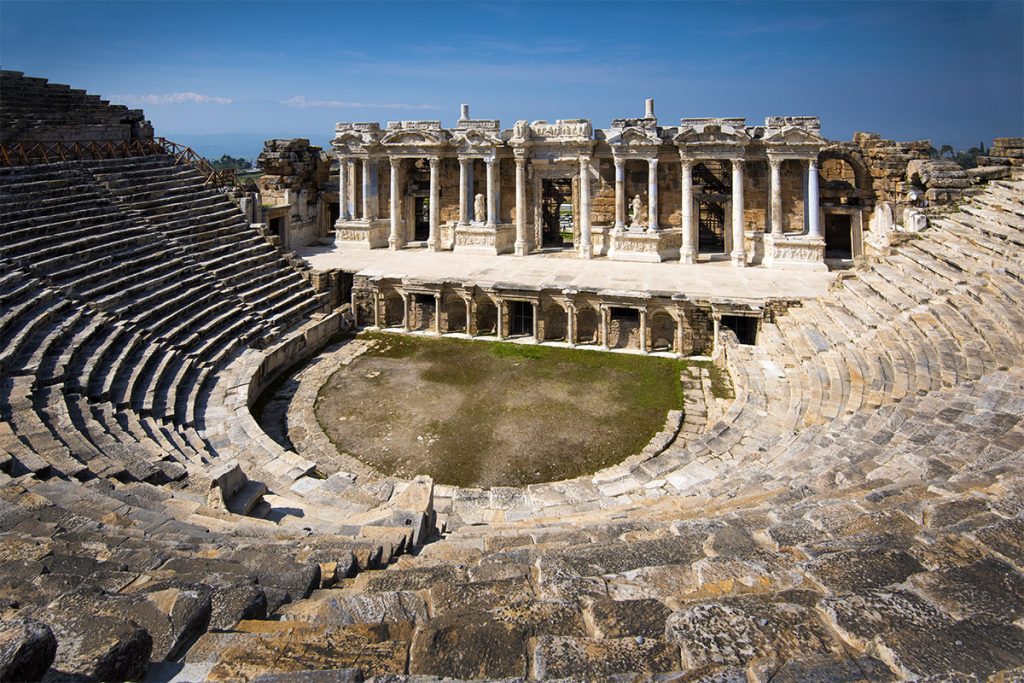
One of the most popular things to do in Pamukkale is to swim in the Antique Pool, once the heart of ancient Hierapolis. Today, constantly refreshed by an inflow of hot calcium-laden mineral water, this former Roman bath is the most popular place to enjoy Pamukkale’s thermal springs. Maintaining an average temperature of 36 degrees Celsius, bathers can follow in the footsteps of Roman aristocrats as they float between submerged Roman columns whilst soothing their travel-weary muscles. If the intriguing ruins of Hierapolis have left you curious to learn more, the on-site Hierapolis Museum is home to some of the original sites most valuable relics including decorative stone reliefs and statues. A wander through this small museum can really help to bring the ancient Hierapolis to life. Finally, at the foot of the limestone cliffs and travertine pools, charming Pamukkale Village is where you’ll find a good array of accommodation options, traditional Turkish restaurants and tourist-friendly cafes, bars and souvenir shops. Spending an afternoon strolling through its Natural Park or boating on the lake against the backdrop of the ‘Cotton Castle’ is a great way to obtain a different perspective of the glistening white pools.
Ephesus
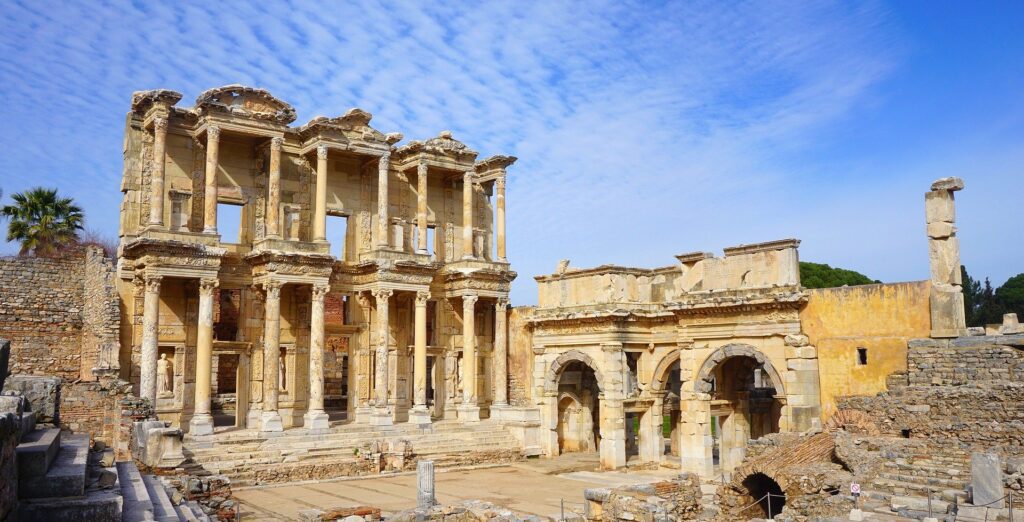
A dream come true for any classical history buffs, a trip to Ephesus reveals centuries of history, from classical Greece to the Roman Empire, and beyond. Situated in Turkey’s Central Aegean region, close to the modern-day city of Selcuk and easily reached from Kusadasi or Izmir, Ephesus is an open-air museum showcasing some of the most important and best-preserved ruins in the Mediterranean. Nestled in the old estuary of the River Kaystros, a tour of Ephesus is a journey through Hellenistic and Roman cultures, with its grand monuments which once attracted pilgrims from across the Aegean and Mediterranean. Thought to have been founded as far back as 6000 BC, Ephesus was both the capital of Hellenic Greece and, later, the capital of the Roman Empire’s Asian province. Ephesus’ most famous monument is the Temple of Artemis, one of the Seven Wonders of the Ancient World, although only fragments of its original ruins remain in Ephesus today. Theologians and archaeologists have always been enamored by Ephesus as not only was it constructed in honor of the ancient Greek god, Artemis, it later became an important place of pilgrimage for early Christians. The apostles Paul and John both had ties to the city, and it’s thought that the Virgin Mary lived her final years near the city.
As one of the largest archaeological sites in the eastern Mediterranean, walking through the extensive complex of buildings and ruins it’s easy to imagine the former splendor of magnificent Ephesus.
What to see in Ephesus
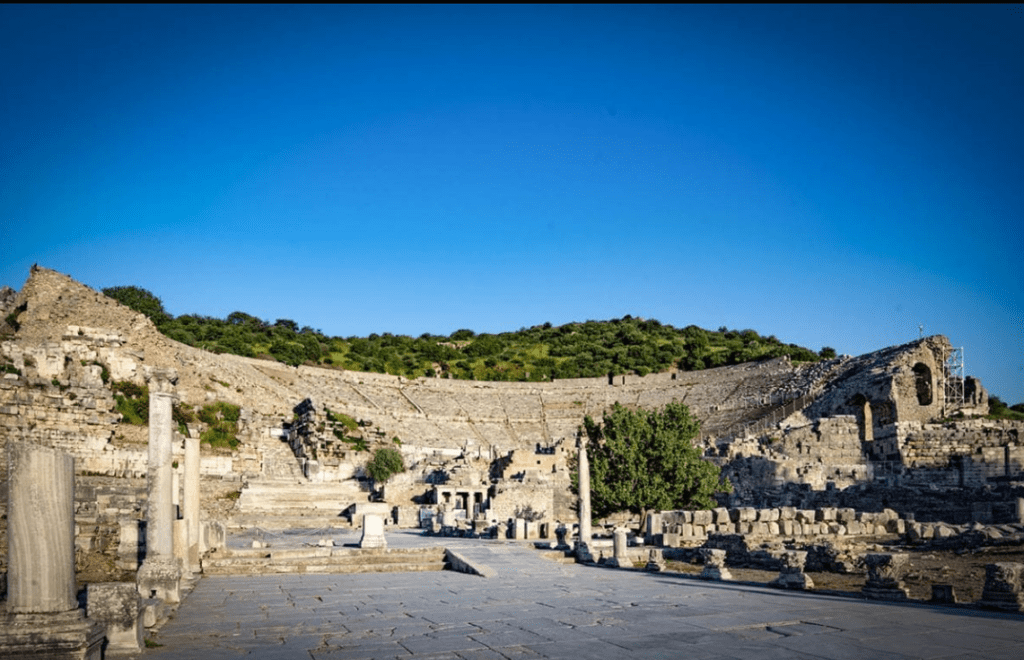
The ancient city of Ephesus is sure to leave you captivated by its immense historical significance and magnificent structures. The whole site works together as a whole to reveal its complex story, but there are a few top things to see in Ephesus that cannot be missed! The Library of Celsus is the most important structure to explore if you travel to Ephesus. An ancient Roman construction, it is strikingly impressive, both in its size and well-preserved state. It was the third largest library in the world during the Roman-era, home to thousands of scrolls, and this marvel of Roman architecture lay in ruins until the 1970s, when archaeologists reconstructed the library from its ruins, returning it to its former glory. Any tour of Ephesus will include the magnificent Great Theatre. Constructed in the 3rd-century BC and enlarged in Roman times, it would have been used to host concerts, plays, political discussion and gladiator shows and seated up to 25,000 spectators! In recent times, the theatre has hosted concerts by huge international artists, but now it is reserved for more intimate performances in order to help preserve the delicate structures. Having uncovered the public spaces of this ancient city, be sure to visit the Roman House in Ephesus, which gives visitors an extraordinary insight into the lives of upper-class Romans. Located in the heart of the city under a protective roof, the admission fee is more than worthwhile for the unique opportunity to examine an authentic two-storey Roman villa for yourself.
Kusadasi
A coastal resort town on Turkey’s western Aegean coast, Kusadasi offers all the much-loved beach vibes and holiday atmosphere, along with a smattering of cultural sights. More than just breezy blue shorelines and beach bars, Kusadasi is the gateway to ancient ruins such as Ephesus and Priene, and the gorgeous landscapes of the Dilek Peninsula. Holidays to Kusadasi have long been popular with holidaymakers who wish to lounge on its the sandy beaches and enjoy the warm warms of the Aegean Sea, but many visitors are unaware of the regions rich artistic and cultural heritage.
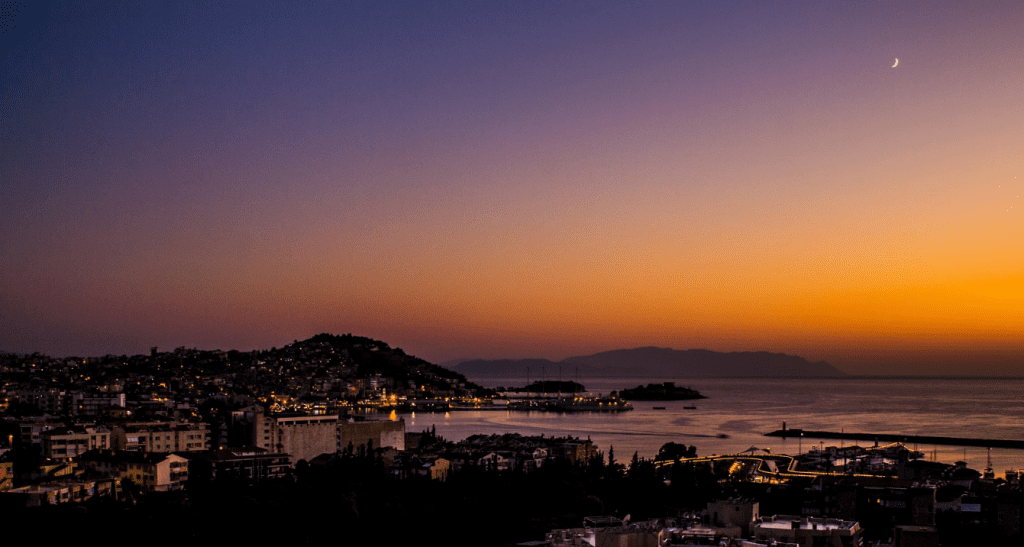
Settled by civilisations as ancient as the Leleges and Ionians, and as diverse as the Persians and Romans, there’s a long and fascinating history along this picturesque stretch of coastline. Foodies are well catered for with restaurants serving both delicious Turkish fare and international cuisine, whilst accommodation ranges from high-end to budget-friendly, with plenty of options for both families and couples, who long for the romance of this beautiful part of Turkey. Many visit Kusadasi as part of a cruise, as it’s a major port for large ships, and Kusadasi’s beachfront promenade is lined with bars and restaurants, making it a holiday paradise. Whether you want the simplicity of a relaxing holiday resort or are searching for a comfortable base for further exploration in western Turkey, a holiday to Kusadasi is an excellent choice.
What to do in Kusadasi
There’s plenty of sights and attractions to fill your trip to Kusadasi, both in and around the resort. Within the town itself, you’ll find the Kaleici Mosque, which dates back to Ottoman times, when it was built by Grand Vizier Okuz Kara Mehmed Pascha in the 17th-century. Another relic built by the Grand Vizier is the impressive Kusadasi Caravanserai, one of the most popular sights in Kusadasi. Constructed in 1618 as a customshouse, it is an imposing walled citadel, today used as a hotel with an open-air restaurant located in its bright courtyard. Here, you can get a taste of Turkey’s Ottoman past. Another of the things to see in Kusadasi is Pigeon Island, an icon of the town’s coastline. Connected to the mainland by a causeway, Pigeon Island is home to an Ottoman-era castle and a number of public beaches. Visit Pigeon Island to soak up beautiful views of the town and shoreline.
Antalya
Antalya, situated on Turkey’s ‘Turquoise Coast’, is a haven of sandy Mediterranean beaches and palm-fringed promenades. An eternally popular resort town, Antalya’s well-preserved old town and yacht-filled Roman-era harbor offer all the romance necessary for a blissful getaway on the Turkish riviera. Although many who travel to Antalya barely leave the comforts of their all-inclusive beach hotels, there are many a historic and cultural gem to be uncovered in the oldest parts of the city, known as Kaleici, some of which dates back to Roman and Ottoman times. Take a stroll through the winding streets of Kaleici and you’ll feel as if you’ve stepped into another world compared to the tourist-centric resorts which typify this region of Turkey.
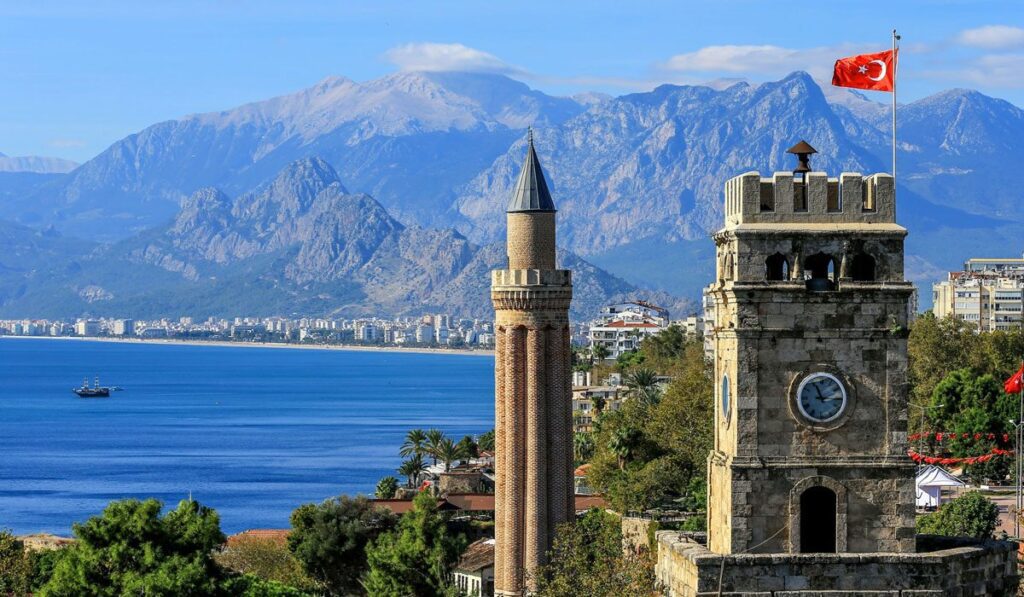
Naturally endowed with stunning landscapes, you can enjoy the tranquility of the Taurus Mountains and the sea breeze of the Mediterranean coast on a holiday to Antalya. The Duden Waterfalls are just one example of the natural abundance of the region. From the atmospheric red-brick walled harbor of Kaleici to the hedonistic resorts of Lara Beach, Antalya is a fantastic choice if you want to combine the charms of Turkish culture with some well-deserved rest and relaxation. Tasty Turkish cuisine, sunset views and long stretches of sandy beaches make Antalya a holiday paradise.
What to see in Antalya
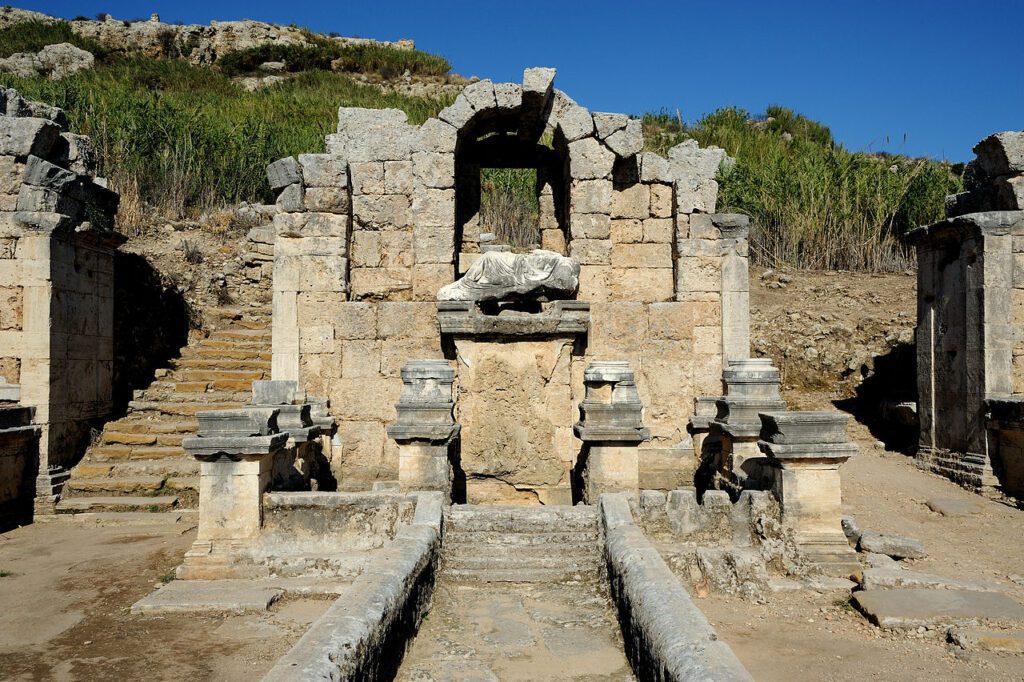
If you choose a holiday to Antalya you’ll find there are a number of things to see if you tire of lounging on the beach. Your first port of call for a slice of authentic local culture is the old town of Kaleiçi, where elegant mosques and Ottoman monuments rub shoulders with crumbling Roman ruins. The Fluted Minaret Mosque is among the most recognizable icons of Antalya’s old town. Also known as ‘Aladdin Mosque’, its fairy-tale fluted minaret, decorated with blue tiles, dates back to the 14th-century. Today, the mosque houses an interesting Ethnographic Museum. From Islamic to Roman architecture, Hadrian’s Gate is a classical-style marble and granite arched gateway, erected for the Roman Emperor’s visit in 130 AD. Still standing at the eastern entrance to Kaleiçi, this imposing triple-arched gateway is one of the most impressive things to see in Antalya. A trip to Antalya is incomplete without enjoying the views from the old town’s Roman Port. Antalya rose to prominence on the Mediterranean due to its accessible natural port, and today, this yacht-filled harbor is still the heart of the city, surrounded by a smorgasbord of bars, cafes, and restaurants. It’s the perfect place to enjoy a late-afternoon cocktail, as well as the starting point for boat trips around the scenic Gulf of Antalya. Once you’ve explored the narrow alleys and historic relics of Kaleiçi be sure to visit the Antalya Archaeological Museum, one of the largest museums in Turkey. The collection of more than 5000 works of art tells the story of human civilization in Turkey from pre-history to the modern-day, including exquisite Roman statues, church artifacts, and Hellenistic pottery. You can’t miss out on exploring this museum if you travel to Antalya as it’s considered one of the country’s finest! A holiday to Antalya is sure to include a considerable amount of beach-lounging and both Lara Beach and Konyaalti Beach are the most popular stretches of sand for visitors and locals alike to plot upon for a day’s sunbathing. Whilst Lara Beach is strikingly glamorous, filled with luxe resorts, restaurants, and beach clubs,Konyaalti is well-known for its lively nightlife and bars and it’s also home to a family-friendly waterpark. If you’re feeling refreshed from all that beach lounging and looking for more things to do in Antalya, a good day-trip destination, just a 20-minute drive from the old town, is the ancient ruins of Perge, where you can discover the fascinating heritage of this region of Turkey. This well-preserved ancient Greek city is sure to whisk visitors back to the days of antiquity. An acropolis on the site is thought to date back to the Bronze Age, so history buffs will be in their element.
Izmir
Izmir exudes over 3000 years of history; from the seafront promenade, which has seen the arrival and departures of civilizations across the millennia, to its hilltop Roman castle, built by Alexander the Great, which looks out over the metropolis of modern-day Izmir.Turkey’s third-largest city after Istanbul and Ankara, Izmir also offers azure shores and breezy beaches where you can kick-back after a day of sightseeing escapades. Izmir’s bountiful heritage can be traced back to classical antiquity when it was known as Smyrna, a powerful ancient Greek city that rose to prominence due to its strategic location on the Aegean Sea.Today, visitors on a tour of Izmir can walk in the footsteps of classical Smyrnans at the Agora Museum, once the political nucleus of Smyrna. Izmir is known as being a liberal, multicultural city. Here, you can sample flavors from around the Aegean and Mediterranean, represented in Izmir’s thriving food scene.
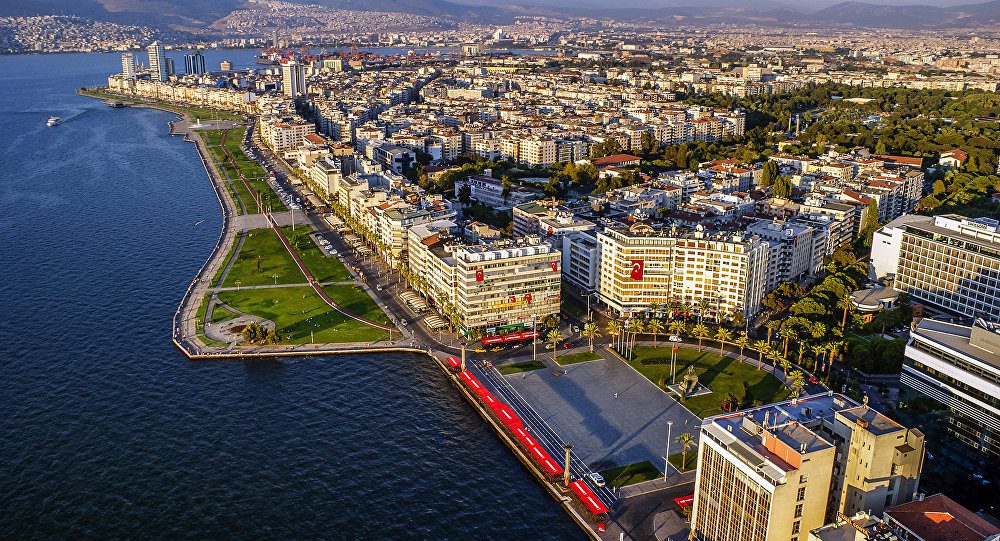
The heart of the city is Konak Square, where visitors can while away the afternoon people-watching in the shadow of the marble clock tower, or wander through the gardens that surround the square’s Konak Mosque. A holiday to Izmir is incomplete without strolling along the seafront promenade, or Kordon, popular with the locals who flock to the walkway in the evenings to soak up the soul-stirring sunset views.
What to see in Izmir
The beauty of Izmir lies in its fusion of antiquity and modernity. There are countless things to see in Izmir to suit all tastes, although it’s hard to resist the pull of the region’s blue flag beaches, so don’t be surprised if sightseeing takes a back seat to beach lounging! A good place to experience the charms of Izmir’s friendly population is in Kemeralti Market, where you can combine a slice of local culture with souvenir shopping. This welcoming central bazaar is a melting pot stalls selling curious gastronomic delicacies and handmade wares.
The hustle and bustle of market life is infectious, and a world away from the shopping malls found elsewhere in modern Izmir. Don’t go home without tasting at least one sticky square of Turkish Delight,made in the traditional way. The most popular thing to see in Izmir is the Agora Open-Air Museum, located in the city center. Visit these ancient ruins to be transported back to Roman-Greek times, when this site once housed a thriving market place. The Corinthian collonade and vaulted chambers are among the most fascinating parts of the site, whilst relics are constantly being unearthed as archaeological works continue to take place at Agora. If you travel to Izmir with a thirst for history, the Kadifekale Castle is another of the city’s heritage sites. Perched atop Mount Pagos, this legendary castle is thought to have been built by Alexander the Great, with parts of the existing fortifications dating back to Roman times. The views across the Gulf of Izmir from Kadifekale Castle are worth the visit alone. Izmir is a delightfully multi-cultural city, and consequently, is home to a large number of synagogues.
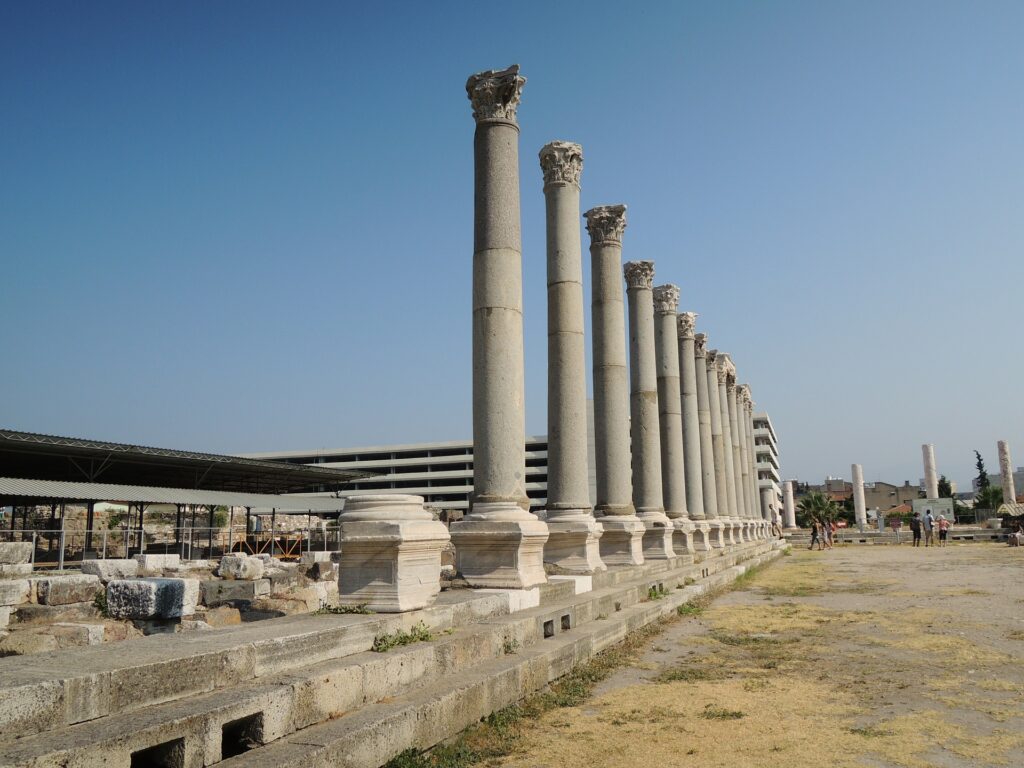
There are nine synagogues in total, found mostly within the historic Jewish Quarter of Karatas, and a walk through these historic streets, where a strong Jewish community prospered from the 17th-centuryonwards, is an eye-opening insight into a relatively unknown aspect of Izmir’s past. Full of hidden gems, a trip to Izmir is incomplete without visiting the Izmir Museum of History & Art. This fantastic institution houses artifacts and relics from ancient Smyrna, Miletos, and Pergamon, making it one of the most comprehensive collections in the country. Split across three pavilions, the Sculpture Pavilion is a real highlight.
Troy
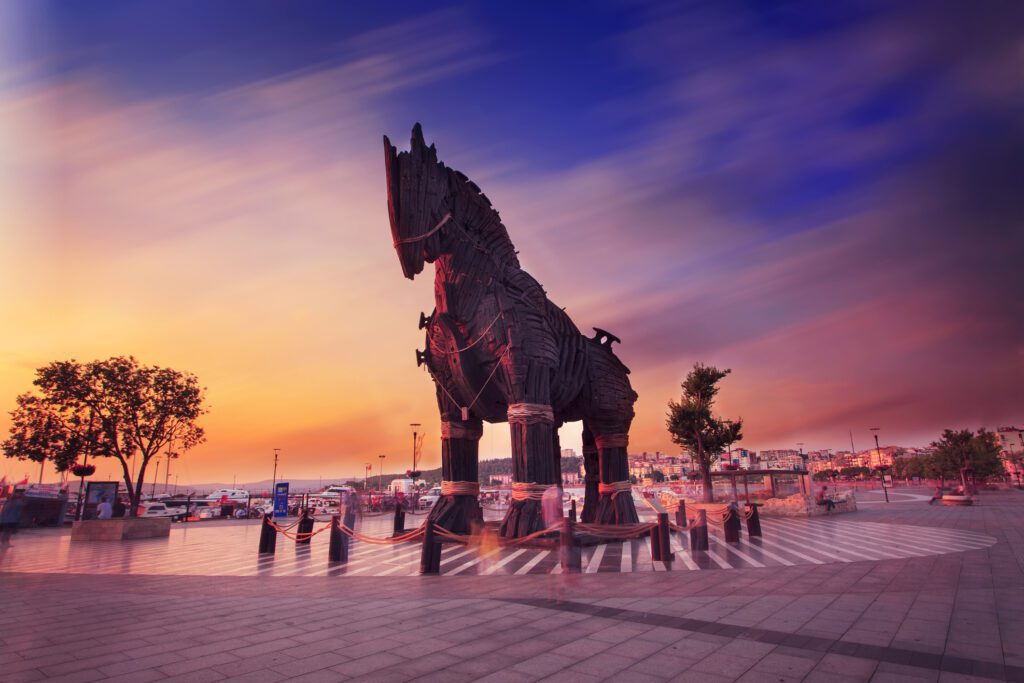
Immortalised in the poetic lines of Homer’s Iliad, the ancient city of Troy, in northwestern Turkey, attracts travellers from around the world to its legendary ruins, believed to be the location of the epic Trojan War. A UNESCO World Heritage Site, whether the legend is fact or just a beautiful piece of fiction, visiting Troy on a tour of Turkey is sure to capture your imagination. The story goes that Helen, the daughter of the king of Sparta, was abducted by a Trojan prince, sparking conflict across the Aegean Sea. The Achaeans, a tribe from classical Greece, travelled to the shores of Troy in an attempt to capture the lost princess but could not break into the fortified city. At a loss of how to progress, they came up with a cunning plan to trick the Trojans, offering them up the gift of a huge wooden horse, which was accepted and brought into the city. Of course, the legend states that hidden inside this wooden horse were Achaean soldiers who were able to take the city by surprise and free Helen. Over the centuries, archaeologists have debated the origins of this tale, although excavations in the 19th-century revealed city walls and structures which showed consistencies with Homer’s legend. Troy was destroyed and rebuilt nine times over, so there’s a number of different parts of the city, which correspond with different historical periods. Whether you’re a believer or not, anyone with an interest in classical history will delight in the chance to travel to Troy.
What to see in Troy
Unlike the palatial columns and avenues of other archaeological sites in Turkey, such as Ephesus, Troy’s ruins consist mostly of Bronze Age stone walls, which trace out the shape of its ancient fortified citadel. These archaeological remains are the highlight of a trip to Troy and although it can be challenging to envisage the overall appearance of the ancient city from the ruined stone structures, it’s easy to imagine how well defended and impenetrable the city was intended to be from the sheer width and height of its city walls, making the legend of Troy even more alluring.
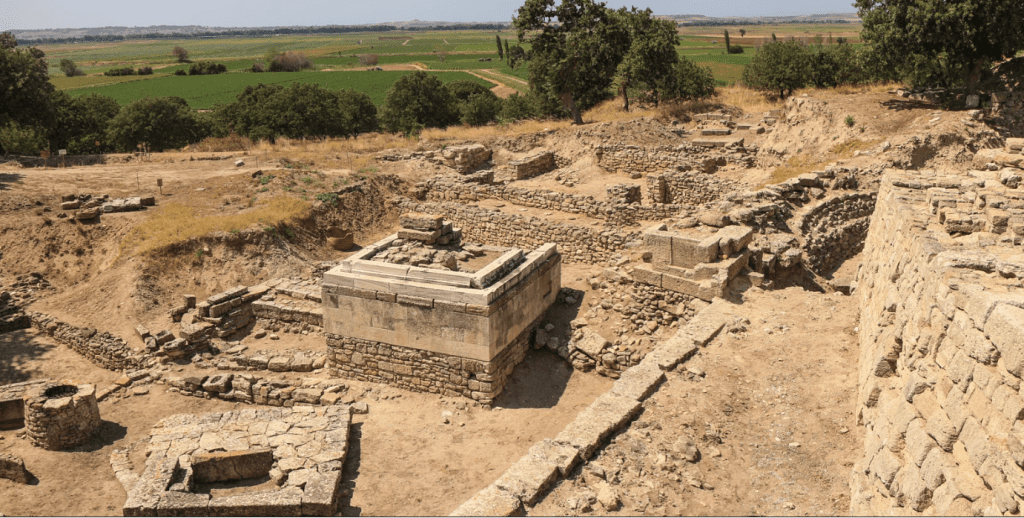
Aside from the ruined walls, other things to see in Troy include Sheliemann’s Trench, a point of some controversy among archaeologists. Heinrich Schliemann, credited with linking the legend of Troy and the site of Hisarlik, dug this trench in the 1860s, although it’s reported his amateur archaeological skills on the site may have compromised the integrity of some of the remains. Nevertheless, his efforts revealed several cities, built one after the other on the site of Troy and shed light on the ancient legends of this mysterious city. If you visit Troy today you can see where Schliemann made his exciting discoveries. To learn more about the historic legacy of Troy, visitors to the city can explore the Troy Museum, home to extensive underground galleries filled with thousands of pre-historic artefacts. Situated in the nearby village of Tevfikiye, a trip to Troy is simply incomplete without browsing the treasures housed inside the Troy Museum. Finally, after all the debate surrounding the complicated origins of Troy, why not have some fun by enjoying a photo-opportunity at the reconstructed Trojan Horse that stands guard at the entrance to the site, an unmissable thing to do if you travel to Troy.










